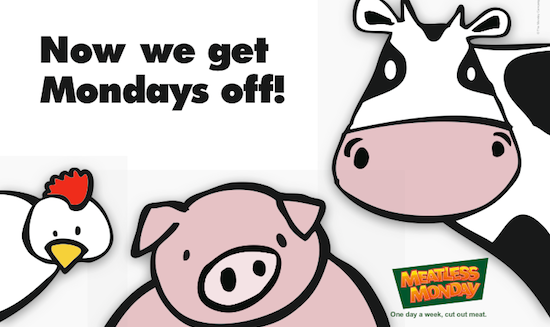Join World Vegetarian Day and Meatless Monday
September 29, 2011
October 1st is the annual world kick-off of Vegetarian Awareness Month. You might be asking, “Why is it necessary to have a month designated for vegetarian awareness?”
It begins with the health and environmental impact of eating meat. On average, people in the U.S. consume about 45% more meat than is recommended. This leads to greater risks for health problems such as heart disease, increased cancer risk, diabetes, and obesity.
A plant-based diet is linked to greater longevity because of how significantly it decreases your risks for the aforementioned health problems. There are also plenty of ways to get the right amount of protein through organic, low-impact protein foods like grains, legumes, nuts, and tofu.
The meat industry also has an enormous impact on our world’s environmental health and may perhaps be the largest negative environmental impact of any human action, according to the United Nations. Just look at these facts:
- Animals create waste. A lot of it. U.S. factory farms generate an estimated 500 million tons of manure a year, polluting American waterways more than all other industrial sources combined. Some manure can be beneficial to plants, but this amount leaches antibiotics, metals, nitrogen, and phosphorous into groundwater and toxic gases into the air.
- Feed production takes 149 million acres of cropland, 167 million pounds of pesticides, and 17 billion pounds of nitrogen fertilizer each year. The pesticide and fertilizer run-off contributes to the pollution of our groundwater, rivers, and oceans.
- More than half of the world’s crops are used to feed animals, not people. When facing global hunger crises, this is an issue that can’t be ignored. The dependency on increasing cropland has directly led to the deforestation of the world’s tropical rain forests.
- It takes a lot of fossil fuel dependence and water usage to produce meat, beef in particular. On average, about 40 calories of fossil fuel energy go into every calorie of feed lot beef in the U.S. (compared to 2.2 calories of fossil fuel for plant-based protein). An estimated 1,800 to 2,500 gallons of water go into a single pound of beef.
- Processing in slaughterhouses creates millions of pounds of toxic waste into our waterways each year. Slaughterhouses consistently rank in the top 20 industrial polluters and take nearly half of those infamous spots.
- Landfills are receiving up to 20 percent of edible meat that has been wasted. All of the environmental costs already mentioned went into something that will rot in a landfill. That is a real waste.
Interestingly, all meat is not created equal when it comes to its impacts. The top three environmental offenders are lamb, beef, and cheese. So, even vegetarians aren’t off the hook!
It is simply unrealistic to expect most people to give up meat (and cheese) altogether, even if they would like to improve their health and reduce their environmental impact. This is where the campaign Meatless Monday comes in. It is a non-profit initiative of The Monday Campaigns, in association with the Johns Hopkins’ Bloomberg School of Public Health, that advocates for families to deliberately choose that they will go meatless on Mondays.
Mondays were chosen not just because of the nice alliteration, but because Monday is a new beginning. Mondays can set the tone for the rest of the week, so making a conscious choice to be healthy can carry throughout.
One of the greatest ideals that comes from the Meatless Monday campaign is that it can free up money to spend on better, greener meat. The following criteria are better for the animals, better for the environment, and better for your health.
Look for:
- Grass-fed or pasture-raised meat
- No antibiotics or growth hormone
- Locally raised
- Certified organic
- Certified humane
- Sustainable seafood
Will you consider giving Meatless Monday a try for October? Here are some recipes to try! What about for a longer period of time?





